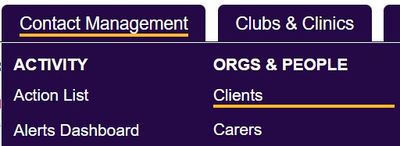Difference between revisions of "Clients"
From Charitylog Manual
Emilewhite (talk | contribs) |
Emilewhite (talk | contribs) |
||
| Line 19: | Line 19: | ||
* '''Customise Orgs & People''' - In [[Customise Orgs & People]] you can specify which fields, widgets, sections and Organisation wide rules you want to apply to that specific record type. | * '''Customise Orgs & People''' - In [[Customise Orgs & People]] you can specify which fields, widgets, sections and Organisation wide rules you want to apply to that specific record type. | ||
* '''Relationships and Carer/Cared Fors''' - You can link multiple records together if they are mutually connected either as a family member or a Carer/Cared For using [[Relationships]]. | * '''Relationships and Carer/Cared Fors''' - You can link multiple records together if they are mutually connected either as a family member or a Carer/Cared For using [[Relationships]]. | ||
| − | * '''Carer Assignments''' - Charities/organisations in the care industry will be on the Carer version of Charitylog. The difference between the Carer and the default version of Charitylog is simply that the carer version of Charitylog refers to the carer as Client and the person they look after is called a Dependent record. The default version refers to the Service User as Client and | + | * '''Carer Assignments''' - Charities/organisations in the care industry will be on the Carer version of Charitylog. The difference between the Carer and the default version of Charitylog is simply that the carer version of Charitylog refers to the carer as Client and the person they look after is called a Dependent record. The default version refers to the Service User as Client and has its own record type for their Carer. It does not have the Dependent record type. |
See [[Set_up_guides#Managing_Clients_and_Service_Users| Set up guides]] for further details on managing service users. | See [[Set_up_guides#Managing_Clients_and_Service_Users| Set up guides]] for further details on managing service users. | ||
---- | ---- | ||
[[File:helpheader_small.png|right]] | [[File:helpheader_small.png|right]] | ||
Revision as of 12:07, 9 December 2024
Contents
[hide]Introduction
The "Client" record type is primarily used for registering the main Service User that your organisation supports. Client is the default name provided but can be tailored to suit using the Terminology function. You can then record information such as:
- Referring the Client record to Projects to record any work that has been completed with/for the service user.
- Any Contact history linked to the service user using the projects that have been set up in Project Set Up
- Recording any outcomes from their projects.
- Creating custom Extension Databases for recording information that can't be found in a standard field.
- For recording and keeping a record of their Carer/Cared Fors and personal relationships such as spouse or parent.
You can use Customise Orgs & People to choose the default sections, widgets and fields you want to display on the record which is useful to modify for each record type according to their uses.
Features
- Customise Orgs & People - In Customise Orgs & People you can specify which fields, widgets, sections and Organisation wide rules you want to apply to that specific record type.
- Relationships and Carer/Cared Fors - You can link multiple records together if they are mutually connected either as a family member or a Carer/Cared For using Relationships.
- Carer Assignments - Charities/organisations in the care industry will be on the Carer version of Charitylog. The difference between the Carer and the default version of Charitylog is simply that the carer version of Charitylog refers to the carer as Client and the person they look after is called a Dependent record. The default version refers to the Service User as Client and has its own record type for their Carer. It does not have the Dependent record type.
See Set up guides for further details on managing service users.

